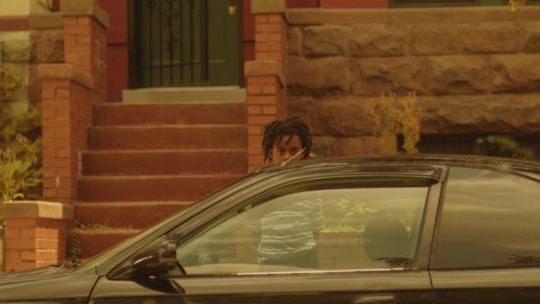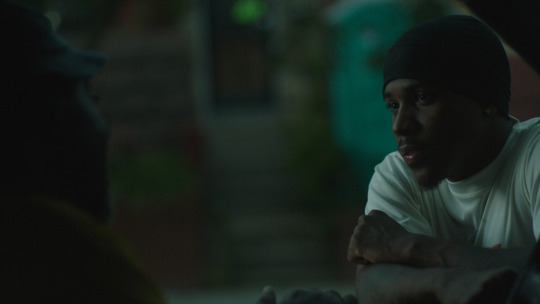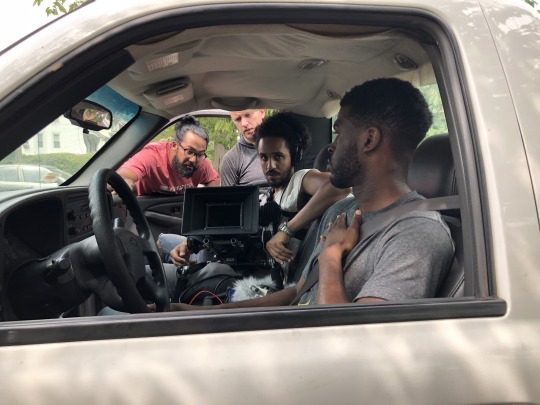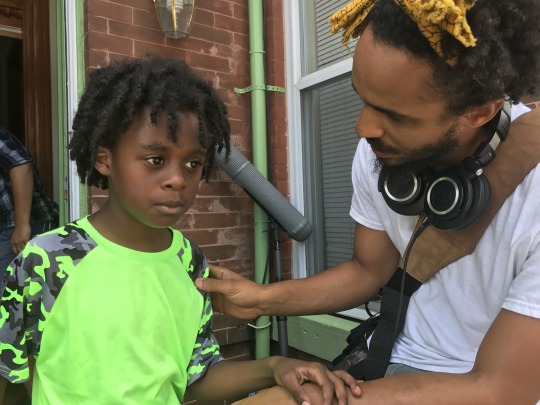#shirikiana aina
Explore tagged Tumblr posts
Text
BRICK BY BRICK (1982) dir. SHIRIKIANA AINA
11 notes
·
View notes
Text
28 films for Black History Month
Black Film Archive has released their 5th annual Black History Month program! I am going to try and watch all of these films this month. Thought I'd share the titles and links here for anyone else who wants to do the same:
To Be Young, Gifted and Black (1972) dir. Michael Shultz
One Way or Another / De cierta manera (1974) dir. Sara Gomez
Whitewash (1994) dir. Michael Sporn
There Was Always Sun Shining Someplace: Life in the Negro Baseball Leagues (1981) dir. Craig Davidson
Freeman (1977) dir. Lloyd Richards
The Final Insult (1997) dir. Charles Burnett
Cosmic Slop (1994) dir. Reginald Hudlin
Sisters in the Struggle (1991) dir. Dionne Brand & Ginny Strikeman
Woodcutters of the Deep South (1973) dir. Lionel Rogosin
Just an Overnight Guest (1983) dir. Gina Blumenfeld
Cornbread, Earl, and Me (1975) dir. Joseph Manduke
Gay Black Group (1983) dir. Isaac Julien
Voguing: The Message (1989) dir. David Bronstein, Dorothy Low & Jack Walworth
Brick by Brick (1982) dir. Shirikiana Aina
Roll of Thunder Hear My Cry (1978) dir. Jack Smight
Cracks (1975) [director unknown]
Paul Robeson: Here I Stand (1999) dir. St. Clair Bourne
Top of the Heap (1972) dir. Christopher St. John
O Happy Day: The Early Days of Black Gay Liberation (1996) dir. Charles Lofton
To Dance with Olivia (1997) dir. Bruce Pittman
Modern Times: The Way of All Flesh (1997) dir. Adam Curtis
The Case of the Elevator Duck (1972) dir. Joan Micklin Silver
Blind Faith (1998) dir. Ernest Dickerson
A Day in the Life of Willie Faust, or Death on the Installment Plan (1972) dir. Jamaa Fanaka
The Magnificent Major (1977) dir. Nick De Noia
Bone (1972) dir. Larry Cohen
A Change of Mind (1969) dir. Robert Stevens
Baldwin’s N— (1968) dir. Horace Ove
Happy Black History Month and happy watching, everyone! ❤️
#I'm not Black so it didn't feel appropriate to write out the title of the 28th film#if there is a better way I could have written it feel free to correct me!#also of course title 4 uses outdated language#not sure what is the appropriate thing to do when listing movie titles like that but i welcome others' perspectives!#Black Film Archive#watchlist
0 notes
Text

23 February 2023
Film: SOCIAL ENGAGEMENT (Film Program, d. various, USA)
Forum: Film Studies Center Format: Digital and 16mm
Observations: This was the final program (before a multi-day academic symposium) in this marvelous series, with three shorts on the topic of political engagement: "Lost Control" (d. Edie Lynch, 1975) about a Philadelphia drug-treatment program; "Brick by Brick" (d. Shirikiana Aina, 1982) about Black D.C. residents fighting and organizing for their rights amidst the upheaval of development; and the remarkable "Your Children Come Back to You" (d. Alile Sharon Larkin, 1979), a young girl's sizing-up about her assimilated middle-class aunt and politically-engaged lower-income mother.
0 notes
Photo

Green-Light Yourself.
As Merawi Gerima’s debut feature Residue lands on Netflix, he tells Gemma Gracewood about being the son of indie film legends, duty of care as a director, and why Akira is his go-to comfort movie.
Sometimes it’s impossible to move forward with your art until you’ve taken a good look back. In Merawi Gerima’s impressionistic and hypnotic first feature, Residue, a young man, Jay, returns from college on the West Coast to find that his Washington, DC neighborhood has been hugely transformed within a few short years. A white neighbor barks at him to turn his car stereo down. Familiar faces have disappeared. The gentrification is debilitating, but Jay’s efforts to work out his disorientation and rage through art meets opposition with old friends.
Like his lead character, Gerima is both a DC native and a graduate of a West Coast college (USC’s School of Cinematic Arts), and was similarly confronted by change when he got home. Making Residue was “absolutely something that I had to do because that was the only positive direction to pour my energies into,” he says. “I think that there was a lot of destructive potential in my life at that point. The film really was the first moment when I started to feel that I perhaps was not powerless in this situation.”

Derron “Rizzo” Scott as Mike in ‘Residue’.
Gentrification as a form of structural racism has long impacted Black communities, and Gerima is not the first in his family to cover this ground. His parents are the LA Rebellion filmmakers Haile Gerima, whose work includes the Golden Bear-nominated 1983 slavery drama Sankofa, and Shirikiana Aina, who documented changes to their DC neighborhood in her 1982 non-fiction short Brick by Brick.
Residue was a family affair; the Gerima name is all through the credits. “My aunts were the chefs; my sister, she was, like, the head of the catering.” Although his legendary father managed to get off lightly with Costco runs, Gerima’s equally impressive mother ended up anchoring two of the film’s most affecting scenes, as Tonya, the Mom of Jay’s childhood friend, Mike (Derron “Rizzo” Scott).
“I had somebody else cast—she was a no-show. My mother was on set that day, just kind of helping feed people. I knew that she had what we needed, emotionally speaking. She was actually trying to drive away to go find the woman; I was like, ‘Nah, I need you right now’. She did it, but at a great cost.” The thing about filming in your own neighborhood, Gerima explains, where you’ve raised not only your own but also everyone else’s kids, with varying outcomes, is you end up bringing that lived experience to your scenes. “It’s very real for her. She’s not acting. I almost cried once we finished filming. Nobody spoke for a long time.”
The scene taught Gerima much about a director’s duty of care—particularly when he dared to ask his mother for a second take of a pivotal scene that takes place in a downpour. “In preparing to shoot in the rain we made a few mistakes, with the camera, the placement, there was miscommunication with me and the DP [Mark Jeevaratnam]. I, he, we both agreed that we needed another take. When I asked my mother for another take, she just looked at us like, it hurt, it was painful to ask. She did what she could, but you could tell that she didn’t have it in her.” As it turns out, the first take was the one. “I thought we ruined everything, but once I slowed down, I just saw what a miracle it was.”
It’s impossible to separate Residue from its limited budget and circumstances. Structurally rich and technically unusual, the film is a triumph of local knowledge, happy accidents, and “hood auditions”, where people were pulled straight off the street into the cast. It’s infused with an all-hands-on-deck spirit, constructed scene-by-scene during a home edit by Gerima himself.
“We shot the first draft of the script. You know what I mean? We didn’t have time to wait for a rewrite. We didn’t have time to wait for money. We didn’t have time to wait for anything. In many ways, it was the source of many of our problems, but it was also the source of a lot of our freedom, because we weren’t tied down by money. We weren’t tied down by a locked-in script.”

Mark Jeevaratnam, Merawi Gerima (with camera), and Obinna Nwachukwu on the set of ‘Residue’.
At Slamdance this past January, Residue won the audience award, and an acting prize for its star, Obinna Nwachukwu, whose story is a lesson for other aspiring actors. He was right for the role (“He fit the bill in terms of, he knows DC lingo, he knows the culture, he’s from the area, which was incredibly important”). More importantly, he was available. “The fact that we didn’t have resources, we needed somebody like him. He wants to act. He designs his life in his way where he was able to give us two weeks without knowing much about us. Once we got him, everything else became a lot easier.”
After Slamdance, of course, 2020 took a bit of a turn. Residue was shortlisted for Cannes, but that was cancelled and in May Gerima told his college paper: “I think that the festival prospects for the rest of this year are getting dimmer by the day.” When we speak, however, he is in Venice, where his debut feature has just screened in the independent Venice Days section of La Biennale di Venezia. It turns out that Cannes Directors’ Fortnight head Paolo Moretti had put in a word with Venice Days. As 2020 goes, this is as good as it gets for new filmmakers—and is a beautiful demonstration of how the global festival community has pulled together to make something good out of the mess we’re in.
Likewise, Gerima is grateful to Ava DuVernay’s ARRAY Releasing, who made the Netflix deal. He notes that a Black-led distribution company is a luxury his parents never knew. “I think if Ava did not exist, our film probably would not have distribution. The broad imagination necessary to see the commercial potential of Black films is still not there. I’m often sad thinking about the fact that my parents had no such opportunity.” Like a scene straight out of Dolemite is My Name, Gerima describes how his folks would book their own theaters across the US and use the African diaspora to help fill them, “proving the commercial nature of these films, in communities that hungered for real Black stories”.

Merawi Gerima directs Jacari Dye on the set of ‘Residue’.
Gerima’s film appetite is wide, and he’s often looked outside the US for inspiration. Some of the most crucial films in his development as a director have been the 1968 post-revolutionary Cuban films Lucia and Memories of Underdevelopment. He is also a fan of La Lengua de las Mariposas (‘Butterfly’, 1999, José Luis Cuerda), which has “one of my favorite endings in film, period”. Japanese influences include Akiro Kurosawa’s Seven Samurai (1954) and Kaneto Shindo’s The Naked Island (1960) and he also looks to Chilean legend Miguel Littin and Soviet directors Andrei Tarkovsky, Sergei Eisenstein and Nikita Mikhalkov. His go-to comfort film? “Akira. I don’t know if it’s comfort, but I watch it all the time! I just think it’s one of the best films ever made.”
On the home front, an “incredible, important” American film is Ivan Dixon’s 1973 action drama The Spook Who Sat by the Door, while the movies that “really put me onto talking to girls” are Gina Prince-Bythewood’s Love & Basketball and Rick Famuyiwa’s The Wood. “These are the types of films, circulating within the Black community [that] we memorize the lines to. That set the sexual compass of Black adolescents, you know what I mean?”

‘Sankofa’ (1993), written and directed by Haile Gerima.
His parents, however, remain Gerima’s greatest influence. “Sankofa was made without arbitration. Black stories that have no minders like that, nobody to answer to, often are far and away, the most honest types of Black storytelling that we see in film.” For other storytellers yet to take the first step, he offers this: “My best lesson from this film has been to always and at all times green-light my own self, my own actions, because that’s the only thing that I can control—and to not wait for conditions to be right or perfect.”
Acknowledging the privilege of being born into a filmmaking family, Gerima adds: “That may not apply to everybody. There are many, incredible things which prohibit action at times. But I think that there are many incredible conditions under which people can take action with the camera. I think that it’s really just a matter of how urgently that story burns within you. I can only say for myself, that’s the way the film got made. Without that, it would have been literally impossible.”
When asked who we should watch next, Gerima recommends 200 Meters, written and directed by Palestinian filmmaker Ameen Nayfeh. (“He’s an incredibly poised and principled filmmaker.”) The film won the audience award at Venice Days. He also recommends Really Love by Angel Kristi Williams, which won a SXSW Special Jury Recognition for acting, and will feature as a Special Presentation at AFI Fest next month.
‘Residue’ is in select US theaters and on Netflix now. Follow Gemma on Letterboxd.
#merawi gerima#haile gerima#la rebellion#residue#netflix#netflix film#array#array releasing#ava duvernay#washington dc#washington dc films#usc#usc cinema arts#letterboxd
7 notes
·
View notes
Photo

“Wazee Wa Mbanga” #SoudyBrown N Mheshimiwa Dc Wa Insta @mwijaku Wakati Tukiwa Njiani Kuelekea Tanga Tumekutana Na Gari aina ya Fuso Iliyokua Imebeba Carbage ikiwa imepinduka, Ikabidi Tujiunge Na Dereva Wa Gari hilo pamoja na Wananchi wengine Kusaidia Kufaulisha Mzigo huo kwa kuupakia kwenye Gari lingine Ukimkuta Mwenzako ana changamoto shirikiana nae Kui solve Panda Upendo kwa wengine utavuna upendo kutoka kwao au kwa wengine Ukipandikiza chuki kwa wengine basi utavuna chuki ww na kizazi chako #PressReleaseShow Ya kijamii . . Special Thanks kwa @tsngrouptz @tsnsupermarketz https://www.instagram.com/p/CBslchZDUQP/?igshid=10jlo8yaydcx4
0 notes
Photo

.@RBGLiveRadio: Footprints of Pan-Africanism w/ Shirikiana Aina LINK: Check Out Real Black & Gifted LIVE Glasshouse Radio broadcasting from the campus of Howard University.
0 notes
Photo

.@RBGLiveRadio: Footprints of Pan-Africanism w/ Shirikiana Aina LINK: Check Out Real Black & Gifted LIVE Glasshouse Radio broadcasting from the campus of Howard University.
0 notes
Text
Film review: Footprints of Pan Africanism by Shirikiana Aina
The idea that is Pan Africanism has been through so many skins that it is difficult to make it out today, although the sentiments and beliefs it embodies are vaguely identifiable in different facets of the african identity. For most of us, the forward facing ideology of Dr Kwame Nkruamh is what we know Pan Africanism to be, preserved in his rousing speeches and timeless policies that hold up his…
View On WordPress
0 notes
Photo






“No one ever forgets the Holocaust. How can we allow someone to forget our Holocaust?“
6 notes
·
View notes
Text














BRICK BY BRICK (1982) dir. SHIRIKIANA AINA
17 notes
·
View notes
Photo

On July 2nd, 2013, we were again allowed the privilege to return to the Sankofa Cafe to view the documentary of Shirikiana Aina, Haile Gerima's wife, called Through the Door of No Return (1997).
9 notes
·
View notes
Text













BRICK BY BRICK (1982) dir. SHIRIKIANA AINA
10 notes
·
View notes
Text
BRICK BY BRICK (1982) dir. SHIRIKIANA AINA
18 notes
·
View notes